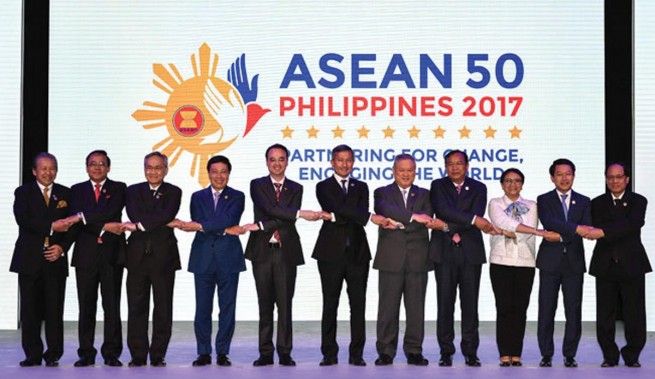Beijing sets precondition before talks
MANILA – The Association of Southeast Asian Nations (ASEAN) and China have agreed to adopt a “framework” for further negotiations on a Code of Conduct (COC) in the disputed South China Sea.
In a news conference on Sunday, August 6, Chinese Foreign Minister Wang Yi announced that he and his 10 ASEAN counterparts have “agreed upon and adopted the COC framework draft,” which aims to prevent an escalation of maritime conflicts in the area.
“Today, the 11 ministers agreed upon and adopted the COC framework draft, and we announce that sometime within the year we will start consultation on the text of the COC,” Wang said.
He, however, failed to affirm if the COC would be legally binding.
“Regarding what kind of COC will be produced, that is up to the discussion by the 11 parties- China and ASEAN countries. We don’t want to prejudge the result of those negotiations,” the Chinese minister explained.
He also cited a condition that must be met before Beijing accepts the announcement in November as the formal start of negotiations between the heads of China and ASEAN nations.
“If there is no major disruption from outside parties, with that as the precondition, then we will consider during the November leaders’ meeting, we will jointly announce the official start of the code of conduct consultation,” Wang said.
According to him, they would discuss the modalities for the actual COC by the end of the month with the approved framework as the basis for their talks.
Wang said the start of talks for a COC in the sea may be announced by leaders of ASEAN and China at their annual summit in the Philippines in November.
“If there is no major disruption from outside parties, with that as the precondition, then we will consider during the November leaders’ meeting, we will jointly announce the official start of the code of conduct consultation,” he stressed.
In a separate press briefing, Philippine Department of Foreign Affairs (DFA) Spokesperson Robespierre Bolivar said that a meeting between ASEAN leaders and China is slated by the end of the month to discuss the modalities for the actual COC with the approved framework as the basis.
“Parallel to this, Asean and China will continue to cooperate on such practical maritime cooperation efforts including management and prevention of conflicts among parties through confidence building measures as well to prevent miscalculations on the ground,” Bolivar added.
China, under its so-called nine dash line, has claimed almost the entire South China Sea. Beijing’s massive claim has been partly disputed by its neighboring countries. The COC aims to prevent clashes between rival claimants.
On Monday, August 7, the foreign ministers of the United States, Australia, and Japan “voiced their strong opposition to coercive unilateral actions that could alter the status quo and increase tensions.”
In a joint statement, U.S. Secretary of State Rex Tillerson, Australian Foreign Minister Julie Bishop and Japan’s new top diplomat, Taro Kono, called on rivaling claimants in the disputed sea “to refrain from land reclamation, construction of outposts, militarization of disputed features, and undertaking unilateral actions that cause permanent physical change to the marine environment in areas pending delimitation.”
They also urged their ASEAN counterparts to swiftly negotiate a legally binding maritime code with China.
In addition to the Philippines, ASEAN-member states include Brunei, Cambodia, Indonesia, Lao, Malaysia, Myanmar, Singapore, Thailand, and Vietnam.








